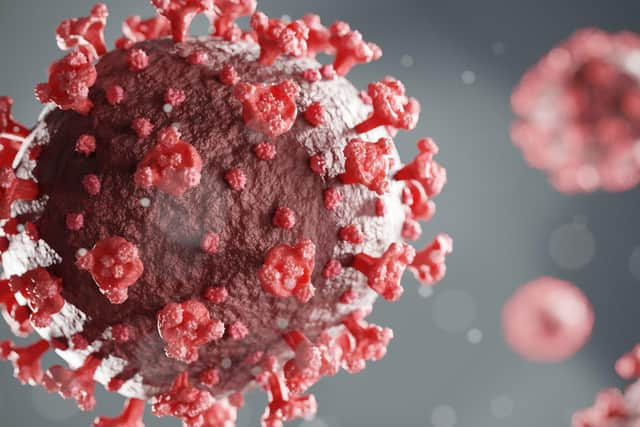How long does Covid last? What are the Covid-19 symptoms and how long does it take to recover?
and live on Freeview channel 276
Evidence is mounting that, even as infection numbers increase, the UK’s vaccine programme is successfully breaking the link between COVID-19 infections, hospitalisations and deaths.
Compared to this time last year we know much more about the virus and how to fight it – including what symptoms it causes, how long they last and how effective the vaccines actually are.
Advertisement
Hide AdAdvertisement
Hide AdHere’s the latest, according to information from the NHS and the Scottish and British governments.
How long does it take to recover from COVID-19?
Many people feel better in just a few days or week, and the vast majority will make a full recovery within 12 weeks.
But for some people, symptoms can last far longer.
The chances of having long-term symptoms does not seem to be linked to how ill you are when you first get Covid-19 and people who develop initially mild symptoms can still have long-term problems.


What are the symptoms?
Some people are completely asymptomatic (meaning they show no symptoms) but most people who do develop symptoms will display at least one of:
Advertisement
Hide AdAdvertisement
Hide Ad- a high temperature – feeling hot to touch on your chest or back.
- a new, continuous cough – this means coughing a lot for more than an hour, or three or more coughing episodes in 24 hours.
- a loss or change to your sense of smell or taste – this means you've noticed you cannot smell or taste anything, or things smell or taste different to normal.
Less common symptoms include a sore throat, fatigue, skin rash, confusion, a dry mouth, red and sore toes and fingers, shortness of breath, muscle pains, loss of appetite, diarrhoea, and chest and abdominal pains.
Advertisement
Hide AdAdvertisement
Hide AdThere have also been reports that the delta variant may be more likely to cause headaches and a runny nose, alongside other symptoms.
Generally, coronavirus can cause more severe symptoms in people with weakened immune systems, older people and those with long term conditions like diabetes, cancer and chronic lung disease.
If you have any of the main three symptoms of COVID-19 you should get a PCR test and self-isolate at home until you get the result.
What is long Covid?
A large number of people have reported suffering symptoms long after contracting COVID-19.
Advertisement
Hide AdAdvertisement
Hide AdThere are are a variety of long-term symptoms you may have after being infected, including but not restricted to, fatigue, shortness of breath, chest pain or tightness, problems with memory and concentration, difficulty sleeping, heart palpitations, dizziness, pins and needles, joint pain, depression and anxiety, tinnitus, earaches, feeling sick, diarrhoea, stomach aches, loss of appetite, a high temperature, cough, headaches, sore throat, changes to sense of smell or taste and rashes.
If you suspect you have long Covid you should make an appointment with your GP.
How effective are the vaccines?
According to the latest figures from Public Health England (PHE), a single dose of either the Pfizer-BioNTech or the Oxford-AstraZeneca vaccine offers almost 50 per cent protection against the Alpha variant a month after receiving it.
This drops to 36 percent protection against the Delta variant for the Pfizer/BioNTech vaccine and 30 per cent for the Oxford-AstraZeneca jab.
Advertisement
Hide AdAdvertisement
Hide AdTwo weeks after the second jab the Pfizer/BioNTech vaccine provides 94 per cent protection against developing symptoms from the Alpha variant, dropping to 88 per cent for the Delta variant.
The Oxford/AstraZeneca vaccine fares slightly worse, offering 74 percent protection against the Alpha variant and 67 per cent against the Delta.
But both vaccines provide a very high level of protection against becoming seriously ill and requiring hospital care with both variants – the Pfizer-BioNTech being 96 per cent effective after two doses and the Oxford-AstraZeneca vaccine 92 per cent effective.
Vaccines Minister, Nadhim Zahawi, said: “It is extremely encouraging to see research showing that vaccines are continuing to help break the link between hospitalisation and the Delta variant after one dose, and particularly the high effectiveness of two doses.
Advertisement
Hide AdAdvertisement
Hide Ad“If you’re getting the call to bring forward your second dose appointment – do not delay – get the second jab so you can benefit from the fullest possible protection.”
A message from the Editor:
Thank you for reading this article. We're more reliant on your support than ever as the shift in consumer habits brought about by Coronavirus impacts our advertisers.
If you haven't already, please consider supporting our trusted, fact-checked journalism by taking out a digital subscription.
Comment Guidelines
National World encourages reader discussion on our stories. User feedback, insights and back-and-forth exchanges add a rich layer of context to reporting. Please review our Community Guidelines before commenting.